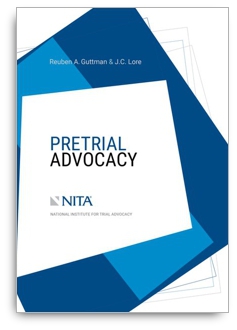On Demand CLE: Pretrial False Claims Act Litigation
Federal Bar Association Webinar – Recorded May 3, 2023
The False Claims Act, which dates back to the Lincoln Administration, provides the government the right to pursue individuals or entities that file or cause to be filed false or fraudulent claims for payment or approval with the Government.
The statute has “qui tam” provisions that allow private individuals – known as Relators – to file suit on behalf of the government. The government has a right to intervene in and take over these suits, but where the government elects not to do so, the Relator may pursue action on behalf of the government and secure a bounty.
Recent years have seen a trend whereby more and more suits are being pursued by Relators – and their counsel – absent government intervention.
From case investigation to pleading and motions practice, this 60-minute CLE program will provide an introductory boot camp on the False Claims Act pretrial advocacy.
Agenda
- Client intake and interviews
- Case investigation
- Complaint preparation and FCA pleading requirements
- Rule 12 Motions practice
- FCA discovery issues
- Summary Judgement
- Experts
- Evidentiary Rules relevant to an FCA case
Date / Time: Recorded May 3, 2023, Duration 1 hour
Closed-captioning available
To learn more or to register visit https://federalbarcle.org/product/pretrial-false-claims-act-litigation/
This course is co-sponsored with myLawCLE.
Speakers:
 Traci L. Buschner | Guttman Buschner, PLLC.
Traci L. Buschner | Guttman Buschner, PLLC.
Traci L. Buschner is a founding member of Guttman Buschner, PLLC. A former state prosecutor, Ms. Buschner has spent over 20 years representing plaintiffs in complex litigation ranging from class actions to government contract fraud. She has been involved in multi-million dollar recoveries on behalf of workers asserting claims under numerous federal statutes and has handled some of the largest successful False Claims Act actions, bringing billions of dollars to the United States Government. Examples of Ms. Buschner’s work include representing:
- The lead whistleblower, Meredith McCoyd, in a False Claims Act case
against Abbott Laboratories, resulting in a settlement of over $1.5 billion. The case involved Abbott’s illegal efforts to promote an anti-seizure medication, Depakote, through off-label marketing, misbranding and paying physicians to write prescriptions. The settlement was one of the largest recoveries by the United States Government under the False Claims Act against a pharmaceutical company - The lead whistleblowers in a False Claims Act case against Wyeth Pharmaceuticals, a subsidiary of Pfizer, resulting in a $257.4 million settlement. The settlement agreement outlined the company’s efforts – for over a decade – to unlawfully market a powerful immunosuppressant drug Rapamune, used to treat patients who have undergone kidney transplants
- A former sales manager in a False Claims Act case against Amgen, Inc., culminating in a settlement of $24.9 million . The settlement agreement charged that Amgen paid kickbacks, in the guise of rebates, to long-term care pharmacies in exchange for switching nursing home patients from a competitor drug to Aranesp and encouraged pharmacists to recommend the drug for uses outside the drug’s FDA label
- A nursing professional and former Sales Manager in a False Claims Act case resulting in a $1.04 billion settlement against GlaxoSmithKline (GSK). The relator alleged that GSK made false and misleading statements about Advair’s safety and efficacy, thus enabling false claims to Medicare, Medicaid, and other reimbursement programs
- One of the six main whistleblowers in a False Claims Act case against Pfizer, Inc., which in 2009 resulted in the government’s recovery of $2.3 billion
- A physician and two nurses in a False Claims Act case against Community Health Systems, Inc. (CHS), which resulted in the Government’s recovery of over $98 million related, in part, to unnecessary emergency room admissions at over 100 separate hospitals across the country
- A certified professional coder in a False Claims Act case against a suburban New York oncology group, resulting in a $5.5 million dollar recovery based upon admissions of co-pay waiver and up-coding
Prior to joining GB, she was an attorney with the Washington, D.C. office of one of the nation’s largest personal injury and labor firms and also practiced with an Austin, Texas firm where she represented victims of asbestos exposure.
Ms. Buschner has represented some of the nation’s largest labor unions and their members. On behalf of the Oil, Chemical & Atomic Workers International Union (OCAW), AFL-CIO, Ms. Buschner was actively involved in environmental litigation which led to Secretary of Energy, William Richardson, canceling a project to recycle radioactive nickel at the Oak Ridge, Tennessee K-25 Nuclear Weapons Complex. The documentation of her efforts to expose faulty government contracting at Department of Energy Nuclear weapons sites was published in The Environmental Forum, Volume 17, No. 6, November/December 2000.
Ms. Buschner has been recognized for several years, by Washingtonian Magazine, as a top Whistleblower Lawyer. Her work on the Abbott False Claims Act case at Grant & Eisenhofer was featured in The National Law Journal, “Plaintiffs’ Hot List” (2011-2012).
Ms. Buschner currently serves on the Executive Committee of the Trial Lawyers Association of Metropolitan Washington, D.C. (TLA-DC) as the Treasurer and Miami University’s Pre-Law Alumni Board. She has also served as a faculty member (2011, 2012,2014 and 2016) for Emory University Law School’s Trial Techniques Program.
Ms. Buschner graduated from Miami University in 1990, and received her J.D. from the University of Louisville in 1995. She is admitted to practice in the District of Columbia; the Commonwealth of Kentucky; the U.S. District Court for the District of Columbia; the U.S. District Court for the Eastern District of Kentucky; the U.S. District Court for the District of Maryland and the U.S. Court of Appeals for the District of Columbia Circuit.
Ms. Buschner has co-authored two articles with colleague Reuben A. Guttman: “Patients Suffer from Drug Industry’s Chronic Greed,” Wall Street Journal MarketWatch (August 7, 2013) and “Taking the Next Step in Pharma Fraud,” American Constitution Society Blog (May 8, 2012).
 Reuben A. Guttman | Guttman Buschner, PLLC
Reuben A. Guttman | Guttman Buschner, PLLC
Reuben Guttman is a founding member of Guttman Buschner, PLLC (GB).
His practice involves complex litigation and class actions. He has tried and/or litigated claims involving fraud, breach of fiduciary duty, environmental derelictions, antitrust, business interference and other common law torts or statutory violations.
The International Business Times called Mr. Guttman “one of the world’s most prominent whistleblower attorneys,” and he has been recognized as a Washingtonian Top Lawyer by Washingtonian Magazine. A February 19, 2015 profile of Mr Guttman by the Boston Globe’s STAT NEWS referred to him as the “Lawyer Pharma Loves to Hate.” Citing a $98 million recovery from Community Health Systems, Inc., Law 360 named Mr. Guttman a “Health Care MVP” and profiled him in a December 1, 2014 article. Author David Dayen, writing in his Book, Chain of Title (The New Press, 2016) cited Mr. Guttman’s work on behalf of robo-signing whistleblower, Lynn Szymoniak, noting “he had won some of the largest awards in the history of the False Claims Act; there was really nobody better for the case.” Writing in their book, The Corporate Whistleblower’s Survival Guide, (Berrett-Koehler Publishers, Inc., 2011), authors Tom Devine and Tarek F. Massarani wrote that “in settling qui tam litigation, [Mr. Guttman] has aggressively and successfully negotiated for corrective action against public health and safety consequences from prescription drug fraud.” In the book, When Good Companies Go Bad, (ABC CLIO, 2014), authors Donald Beachler and Thomas Shevory profiled Mr. Guttman’s off label marketing case against Abbott labs, involving the drug Depakote, which resulted in a $1.6 billion recovery in 2012 for state and federal governments. The Spring, 2013 Cover Story for the Emory Lawyer, profiled Mr. Guttman as one of Emory Law School’s leading players in the area of complex litigation noting that “even before filing a case, Guttman’s team engages in intensive investigation, retains experts and prepares as if a trial is imminent.”
Representing one of the six main whistleblowers in litigation, Mr. Guttman’s work resulted in the government’s September 2009, $2.3 billion settlement with Pfizer Pharmaceutical. In addition to the Abbott Lab’s $1.6 billion settlement in 2012, Mr. Guttman represented one of the main whistleblowers in a case against GlaxoSmithKline that returned over $3 billion to the government. That same year Mr. Guttman represented whistleblower, Lynn Szymoniak, whose qui tam case, involving fraudulent mortgage assignments, was resolved as part of the government’s $25 billion settlement with some of the world’s largest banks. The following year, in 2013, Mr. Guttman was lead counsel for the lead False Claims Act whistleblowers in a case involving the kidney-transplant drug, Rapamune. That case culminated on July 30, 2013 in a U.S. Department of Justice announcement that Pfizer had agreed to pay $491 million to settle criminal and civil charges stemming from the illegal marketing of Rapamune by Wyeth Pharmaceuticals, which was acquired by Pfizer in 2009. In 2013, Mr. Guttman was also lead counsel in a case against Amgen, Inc. et al., resulting in the recovery of $24.9 million. In 2014, Mr. Guttman recovered $4.19 million from co-defendant, Omnicare, and in 2015 he recovered another $2.15 million from co-defendant Pharmerica. On October 17, 2016, Mr. Guttman and his firm, GB, announced the recovery of another $28 million from Omnicare. That same month, GB announced the recovery of $5.3 million in a case involving fraudulent Medicare claims submitted by a New York State provider.
Mr. Guttman was counsel in U.S. ex rel. Johnson v. Shell Oil Co., 33 F. Supp. 2d 528 (E.D. Tex. 1999), where over $300 million was recovered from the oil industry. On behalf of a European whistleblower, Mr. Guttman was counsel in litigation that resulted in a $13 million settlement.
He served as lead counsel in a series of cases resulting in the recovery of more than $30 million under the Federal Fair Labor Standards Act. Cases brought by Mr. Guttman on behalf of nuclear weapons workers at “Manhattan Project” nuclear weapons sites resulted in congressional oversight and changes in procurement practices, and dread disease compensation legislation, covering the nation’s nuclear weapons complex workforce. A case brought by Mr. Guttman against the Secretary of Energy under the National Environmental Policy Act (NEPA) resulted in the cancelling of a project to recycle radioactive Nickel at the Oak Ridge National Laboratory.
Mr. Guttman served as lead counsel in litigation brought on behalf of prison workers in the District of Columbia, resulting in injunctive relief protecting workers against exposure to blood-borne pathogens and he served as lead counsel in a mediation before the United States Equal Employment Opportunity Commission, resulting in work place standards and back pay for minority employees at a large Texas oil refinery.
In addition to his work on behalf of workers and whistleblowers, Mr. Guttman is the author and/or editor of numerous articles, book chapters, and technical publications.
His commentary and/or articles have appeared in Market Watch, American Lawyer Media, AOL Government, Accounting Today, the Jerusalem Post, the International Business Times, the Atlanta Journal/Constitution, The Hill, Forbes, Law 360, Blog of The American Constitution Society, and the Fulton County Reporter. Mr. Guttman has written almost 100 commentaries on politics and the law for The Global Legal Post – www.globallegalpost.com. He was a founder and contributing editor and a writer for The Regulatory Analyst; Medical Waste (Warren, Gorham & Lamont, Publishers)
His article, Pharmaceutical Regulation in the United States: A Confluence of Influences, was published in Chinese by the Peking University Public Interest Law Journal, Vol. 1, Page 187 (2010). He is co-author (with Professor Paul Zwier) of A Failure of Remedies: The Case Against Big Pharma, (Emory Corporate Governance and Accountability Review, 2016). He is also co-author (with Jennifer Williams) of Controlling Government Contractors; Can the False Claims Act be More Effective (Sedona Conference Journal Vol. 14, Fall, 2013). And he is a co-author (with Professor Paul Zwier) of The New World of Electoral Politics and What It Means; An Introductory Essay, (Emory Corporate Governance and Accountability Review, 2017).
Mr. Guttman is co-author of SEC v. HG Pharmaceutical and Gonzalez v. Hewitt which are “case files” published by the Emory University School of Law Center for Advocacy and Dispute Resolution and used to train law students and practicing attorneys. He is also co-author of the case file, United States ex Rel Rodriguez v Hughes, et. al (Defendants Materials, Relators Materials, Faculty Materials), (National Institute of Trial Advocacy, 2016). Mr. Guttman is author or co-author of Chapters 5-10 in Internal Investigations: How to Protect Your Clients or Companies in the Global, Post Dodd-Frank World (Practicing Law Institute, 2012). He is co-author (With Professor Kathryn Wagner) of The Asbestos Model; Labor and Citizens Groups and a Multipronged Approach to Regulatory Change (published as Chapter 5 in Conflict Resolution and Public Policy, (Edited by Miriam K. Mills, Greenwood Press, 1990). He served as an advisory board member and Chapter author for Environmental Management in Healthcare Facilities (W.B. Saunders, 1998). He is co-author with Professor J.C. Lore of Pretrial Advocacy, (Lexis-Nexis and the National Institute of Trial Advocacy) (Work in progress to be published, Fall 2017).
He has appeared on ABC Nightly News, CNN, Bloomberg News, and has been quoted in major publications including The Wall Street Journal, The New York Times, The New York Post, The Washington Post, The Washington Times, The Los Angeles Times, The Atlanta Journal-Constitution, USA Today, Houston Chronicle, Dallas Morning News and national wire services including the Associated Press, Reuters and Bloomberg.
In addition to his writings, Mr. Guttman has testified before committees of the United States House of Representatives and the United States Senate on the Asbestos Hazard Emergency Response Act (AHERA). In 1992, he advised President-elect Clinton’s transition team on labor policy and worker health and safety regulation.
He has been a Senior Fellow and Adjunct Professor at the Emory University School of Law Center for Advocacy and Dispute Resolution and has been a Team Leader for Emory Law School’s Kessler-Eidson Trial Techniques Program. He served on the Emory Law School Dean’s Advisory Board and received the Emory Law School Alumni Service Award in 2015. He is a founder of and Senior Advisor to the Emory Corporate Governance and Accountability Review (ECGAR), and a faculty member of the National Institute of Trial Advocacy. Mr. Guttman has also served as an Adjunct Professor at the Rutgers University School of Law.
As part of a U.S. State Department program in conjunction with the Emory law Center for Advocacy and Dispute Resolution, he has been one of five visiting professors at Universidad Panamericana in Mexico City, training Mexican Judges and practitioners on oral advocacy and trial practice. He has been a guest lecturer at a number of universities including John Hopkins, the University of Pennsylvania, Jiao Tong University in Shanghai, Peking University in Beijing and Renmin University in Beijing. In 2006, the Dutch Embassy in China invited him to share his perspectives with experts in China about changes to the nation’s labor laws.
Mr. Guttman earned his law degree at Emory University School of Law, (1985), and his Bachelor’s Degree from the University of Rochester, (1981). He began his legal career as Washington, DC counsel for the Service Employees International Union, (SEIU), AFL-CIO where he served from 1985 until 1990. He is admitted to practice in the State of Georgia; the District of Columbia; the Commonwealth of Pennsylvania; the State of New Jersey; the Supreme Court of the United States, the United States District Courts for the District of Columbia, the District of New Jersey, the District of Nebraska, the Northern District of Georgia, the District of Maryland, the Western District of Michigan, and the Eastern District of Pennsylvania; and the United States Courts of Appeal for the Third Circuit, the Fourth Circuit and the D.C. Circuit.
Mr. Guttman is a Fellow of the American Bar Foundation. Mr. Guttman served on the board of the American constitution society and currently serves on the advisory board. He is the founder of www.whistleblowerlaws.com.

